I have become a homeopathic gardener. I have been dabbling for years, but the COVID lockdown has given me the motivation to get into my plant and vegetable garden with homeopathic texts in hand, to sort out some pest problems, nutrient deficiencies, and experiment with a few homeopathic hacks to find the agrohomeopathy remedies to match my needs.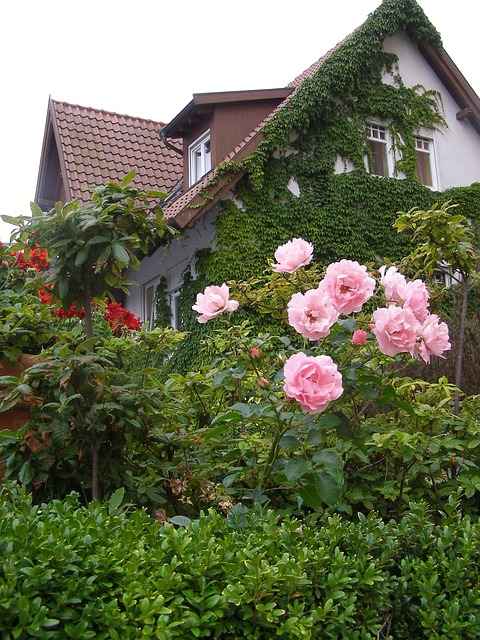
I am a Darwinian gardener by nature, where the rule is survival of the fittest, with a strong leaning towards plants that are low maintenance and water wise. My garden is on a steeply sloping site of minimal soil and small rocks on a base of clay, and very large gums. It has been my challenge for the last 5 years.
I had been using Rescue Remedy after potting and planting, so using homeopathic remedies was a natural progression. Starting out with first aid remedies, I experimented with Arnica and Calendula after pruning, Aconite for shock (temperature and trauma) and Belladonna for sunburn. I had so many successes with these basics that I was inspired to search for books on the topic, and have not looked back. These days my favourite ‘go to’ books are Homeopathy for Plants by Christiane Maute, and Homeopathy for Farm and Garden by V.D. Kaviraj.
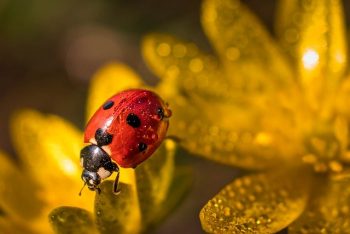 The easiest one to use is Homeopathy for Plants, an easy practical guide with lots of pictures of common plant diseases, pests and injuries, making identification easy. All the usual suspects are covered, including damage by aphids, scale & caterpillars, trauma from pruning, potting, frost and damage, and bacterial and viral diseases. Each condition has a list of indicated homeopathic remedies and a guide to choosing the most appropriate one. The handy reference materia medica helps decide between remedies, and the when and how of applying the remedies is easy to follow.
The easiest one to use is Homeopathy for Plants, an easy practical guide with lots of pictures of common plant diseases, pests and injuries, making identification easy. All the usual suspects are covered, including damage by aphids, scale & caterpillars, trauma from pruning, potting, frost and damage, and bacterial and viral diseases. Each condition has a list of indicated homeopathic remedies and a guide to choosing the most appropriate one. The handy reference materia medica helps decide between remedies, and the when and how of applying the remedies is easy to follow.
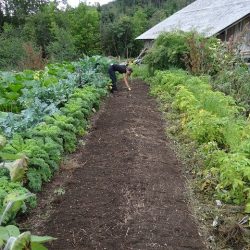 Homeopathy for Farm and Garden by V.D. Kaviraj takes all this to the next level. Kaviraj, a professional homeopath, spent years researching and experimenting with homeopathic remedies in both small and large scale agricultural and market garden settings. This book is a more technical read, but well worth the effort as it describes the practical use of agrohomeopathy and indications for the use of the most successful and well researched remedies, many of which do not appear in Christiane Maute’s book. The comprehensive index of pests and diseases is backed up by a repertory which describes the effect on the plant. So you don’t need to know the name of the disease, you just need to describe the symptoms that you see (as you would with a person) which leads you to the best remedies. These remedies have worked so well in my garden that this book is now my bible.
Homeopathy for Farm and Garden by V.D. Kaviraj takes all this to the next level. Kaviraj, a professional homeopath, spent years researching and experimenting with homeopathic remedies in both small and large scale agricultural and market garden settings. This book is a more technical read, but well worth the effort as it describes the practical use of agrohomeopathy and indications for the use of the most successful and well researched remedies, many of which do not appear in Christiane Maute’s book. The comprehensive index of pests and diseases is backed up by a repertory which describes the effect on the plant. So you don’t need to know the name of the disease, you just need to describe the symptoms that you see (as you would with a person) which leads you to the best remedies. These remedies have worked so well in my garden that this book is now my bible.
Waterlogged plants and gardens and plant virus homeopathy
With all the rain the East Coast of Australia has received over the past 12 months, water-logging has become a problem for many. In Christiane Maute’s, Homeopathy for Plants book, she says:
If leaves are wet for a long time, the plant will become more susceptible to fungal diseases. Waterlogging around roots also causes damage and bulbs may rot.
Treatment and prevention: Aerate the soil by thorough hoeing. You may have to drain the soil or change the plant’s location. Sand can be worked into clay soil. Main homeopathic remedies for water logging:
Belladonna 200c – Brownish-red leaf discolouration.
Natrium Sulphuricum 30c – Fungal infections. Brown rot on tomatoes. Decaying roots.
Pulsatilla 30c – Decaying roots
Sulphur 200c – Roots and soil smell musty and rotten. Fungal diseases.
Thuja 30c – Fungal and viral diseases.
My Favourite Agrohomeopathy Remedies
There are usually several remedies suggested for any pest or disease, and it depends on the plant itself (constitution and therefore susceptibility) as to which remedy will work best. Just as when deciding between remedies for a person, we need to take into account the individual plant which is being attacked. Different families of plants are more prone to attack by aphid, roses for example and one remedy may work better on aphids on roses, Cimicifuga is often recommended.
Generally, a homeopathic remedy will act as a deterrent to a particular pest or disease and then with the occasional dose of plant tonic Silicea 200C, plants become healthier and less susceptible to attack.
Silicea 6x – the Water Wise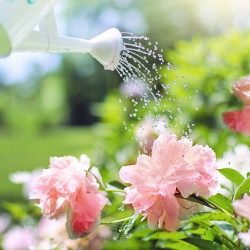
One of the most exciting remedies that I discovered in Kaviraj’s book was the use of Silicea 6x for its ability to increase the water holding capacity of soils, and also for weed control, when used appropriately. Much of Kaviraj’s research was carried out in Perth, W.A. where the soil is both sandy and often hydrophobic. He showed that homeopathic Silicea 6X, used sparingly, could green a desert but if used too frequently, would produce one.
I took this as my challenge and over the last two years of periodic drought in Sydney, with watering restrictions in place, I have used Silicea 6X once every 3-5 months. I watered minimally by bucket over the summer and yet my garden thrived. I am a convert and no longer use a chemical wetting agent.
Silicea 6X – the Weed Killer
Now, BEWARE the double edged sword of Silicea homeopathy, where a minimal dose of 6x helps soil retain water the opposite occurs if used too frequently, that is, an over dose! How homeopathic! If you have ventured into the philosophy of homeopathy, you will know that one of the laws of homeopathic cure is the use of ‘minimal dose’. But we can use ‘overdose’ to our benefit by weakening the plant and causing it to die. Silica can also be used to set up premature flowering, which weakens the plant and prevents seed formation, thus acting as a natural herbicide.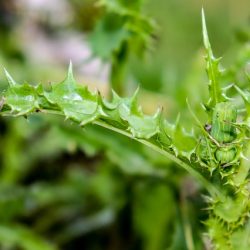
Silicea for plants as a weed killer – apply Sil 6x to the weed, reapply the following day, and if necessary the next day also. Generally, 2 applications given 24 hours apart are sufficient to weaken and kill the plant.
Silicea 200C – the Strengther
Silicea in homeopathy (commonly known as Silica) has a wide range of actions on plants. It acts on the cells and tissue providing strength and regulates cellular processes, including reproduction. Silicic acid forms the supportive substance allowing plants to grow strong and erect. A single dose of Silicea 6x can help seed germination, when given at planting time, and increase fruit and flower production.
I use Sil 200C as a tonic several days after repotting or planting, and I will give a dose to any stressed or damaged plants. I water the entire garden every 4 months with Sil 200C which reduces any fertilizer use, and seems to protect the plants from pest and disease issue.
Helix tosta – Snail & Slug Deterrent
This remedy is prepared from a toasted snail shell. When Helix tosta 6x is watered around the roots of snail and slug sensitive plants, the snails will wander off and eat your weeds, or better still remove themselves to the neighbour’s garden. So don’t use on the weeds, and be prepared to share your Helix-tosta with the neighbours. Apply Helix tosta 6x every 2-3 months, or when you are sure the nibbled leaves are definitely the work of snails, otherwise you run the risk of overdosing, which may result in attracting the snails back.
Coccinella septempunctata – Aphids AWAY
The Lady bird or lady bug (Cocc-s) is a natural predator of soft bodied insects such as aphids, fruit flies, white flies and silverfish. So the homeopathic remedy Cocc-s 6C will drive them away in droves. A useful homeopathic insecticide.
Recently my Oncidium orchids, whilst flowering beautifully, came under attack by white flies. The sticky substance under the plants, the exudate of the sap suckers, was the first indication that all was not well. One spray and watering with Cocc-s and 2 days later the plant was virtually clear. Worked like a dream.
I have just discovered Cocc-s 6C listed for being effective on mosquitoes. I can’t believe I missed this one. I am very excited (sad, I know!) as I have struggled with my large bromeliads being a reservoir to marauding mossies over summer. I was considering re-homing the plants! I will definitely be counting wrigglers after a dose of Cocc-s next summer.
Bombyx processionae – caterpillar & moth repellent
Bombyx 6C is an effective repellent of caterpillars on most plants, but particularly for Brassica vegetables such as cabbage, broccoli, and brussell sprouts, all of whom suffer from Cabbage moth/caterpillars. It also works well on army worms, sawfly larvae and other caterpillars.
Formica ruta – ant colony eviction
Formica 6C is an excellent aid to forcing the relocation of ant colonies that invade pot plants and garden beds, displacing soil and generally behaving badly. A single dose is usually enough to send them packing, although it can take a day or two. You know what packing up house is like! Delay repeating the dose, as over dosing may act as a misinterpreted invitation to stay. If they don’t seem to get the message, try a dose of Camphora.
Carbo vegetabilis – the reviver
Carbo-veg 6 C is the remedy you use when you think the plant is going to die. I have used this with great success after a too vigorous boy prune and also following outright neglect. I collect/rescue ‘near death’ plants from friends and family and often manage to revive them with Carbo-veg. Almost like a homeopathic plant fertilizer.
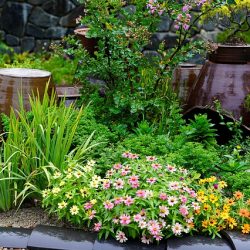
Agrohomeopathic pesticides
Shellac 6X – hard scale
Coccus cacti 6X – soft scale
Chrysoperla carnea – mealy bugs, spider mites
Instructions for Remedy Use and Storage
Add two pills of your chosen remedy to 200 ml of water, shake vigorously, and spray on the leaves of the plant and/or water into soil above the roots. Use 6 pills in 10L water can, if watering larger areas. If using the remedy for pests, spray the area where the pests collect. Remedies may also be used in a trickle water system.
Store pills and liquid away from light, EMF appliances (mobile phones, laptops, fridges, microwave ovens) and protect from high temperatures.
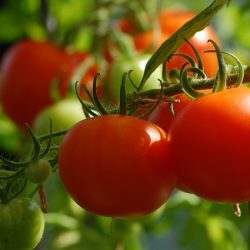
Natural remedies
Using environmentally friendly products like homeopathy for plants and gardens is important to me, whether it be for waterlogged plants, growing an organic vegetable garden, or using agrohomeopathy remedies. I often consult ABC’s Gardening Australia web site for their wealth of knowledge on home remedies for the garden.
- Homeopathy for Waterlogged Plants and Gardens - 12/10/2022
- Allergies relieved with Homeopathy - 20/09/2020
- Homeopathic Travel Remedies First Aid Kit - 08/10/2019



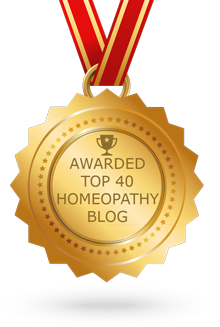
Leave a Reply